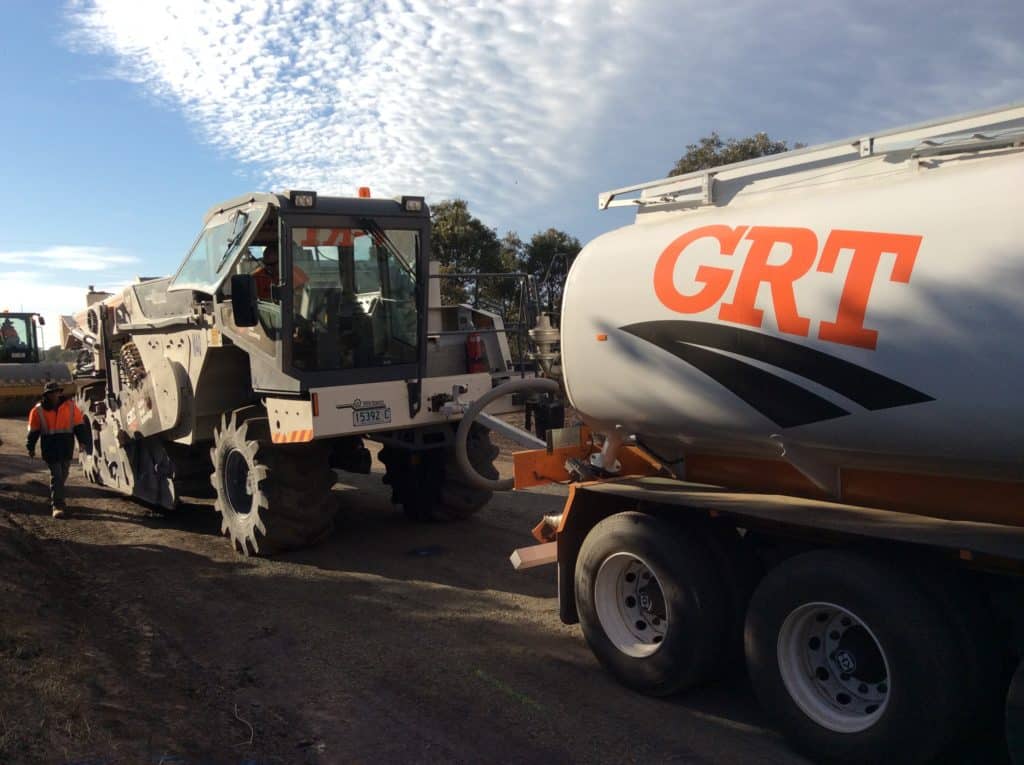
GRT welcomes a recent report from peak road transport and traffic agency organisation, Austroads supporting the usage of marginal and non-standard materials when constructing and maintaining roads.
Titled, the “Appropriate Use of Marginal and Non-standard materials in Road Construction and Maintenance,” this report outlines the current concerns around the use of existing road-building materials and their finite nature. According to the report, it is now a major challenge for road agencies to source quality quarried materials and natural gravels to be utilised for road maintenance and building.
This report signifies a greater acceptance of the usage of non-traditional materials in constructing new roads, at the same time as industry leaders like Boral start to increase the usage of recycled materials like waste tyres, plastic, glass and old road pavement (four in total) in the construction of streets.
The wider use of non-standard road building materials is due in some part because road-building agencies are now paying to access what were previously free natural gravels.
GRT General Manager Daniel Grundy believes that this report further validates the significant investment the firm has made into alternative road-building materials and its early adoption of non-traditional methods of infrastructure construction.
“From the onset, GRT recognised the value of using non-standard materials in the construction of roads – a decision made on a financial, logistical and practical level due to the remote areas we operate in,” Mr Grundy said.
“The transportation of gravel quarry products to the areas of remote Australia we were working in would simply have cost too much in terms of both building and the ongoing maintenance of these new roads – whether it be on major mine sites or agricultural access roads. Our use of non-traditional methods, technology and applications in dust control, soil stabilisation, erosion control and water management provided clients with a solution for developing the required infrastructure for their projects or needs – it is great to see the wider acceptance and usage of non-traditional road-building materials further validated by this report.”
GRT has a wide range of products first developed in the conditions faced in regional Australia as a response to the lack of traditional material that is now delivered globally – utilising constructions methods and bespoke application methods to maximise efficacy.
According to Daniel, this experience in regional Australia is a critical component behind GRT’s global growth as it forced them to continually innovate in terms of delivering infrastructure and invest in R&D
“This experience during the early days of the firm forced us to continually innovate in terms of delivering infrastructure – a factor that is now paying dividends for us as greater acceptance of non-traditional road-building material gathers pace,” said Mr Grundy.
“The GRT PCM – a polymer stabilisation technology – is a great case in point in terms of the strength of these products as it is shown to reduce the instances of fatigue cracking, increase compressive strength and improve road resilience. This is the perfect example of why the popularity of new road-building technologies is gathering pace and why acceptance from peak bodies is growing as the benefits can clearly be seen.”
About GRT:
GRT is an international company that provides revolutionary solutions to deliver better and safer infrastructure and operational outcomes across the roads, resources, and rural sectors.
GRT products and applications have been developed by their own team of engineers and scientists, working in partnership with leading industry and academic institutions. GRT’s technology can be applied across a broad range of materials and environments to create durable, safe, and sustainable infrastructure and operations.
Contact GRT for further information about the company and its products.
Are environmental regulations, health and safety concerns or potential profit loss a concern right now?
Contact Us Now